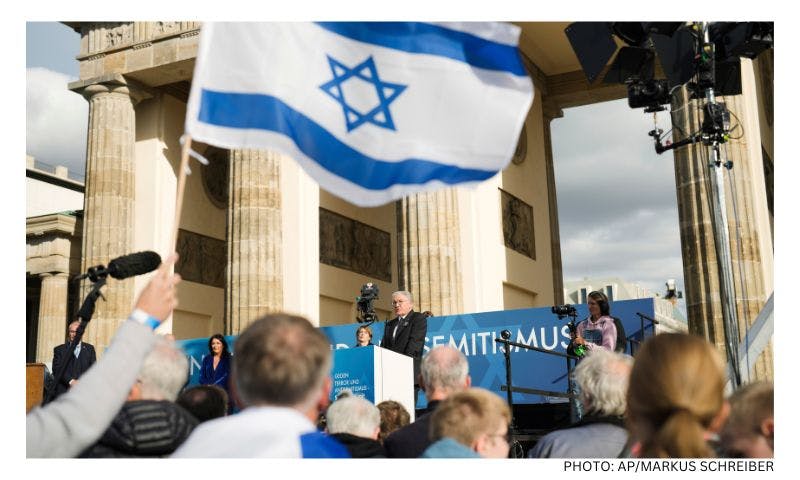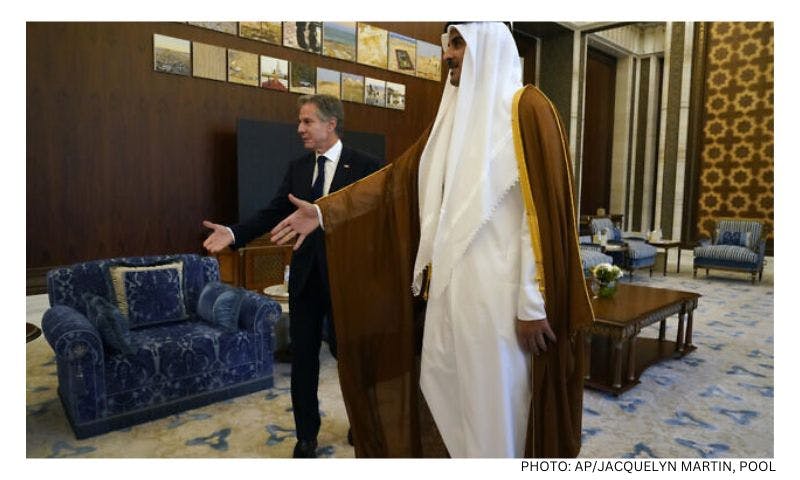Published: 24 May 2022
Last updated: 4 March 2024
Mark Leibler was there when the Uluru Statement was declared. Now he thinks he will be here when it becomes law
AFTER 20 YEARS of working for reconciliation, Mark Leibler believes Australia turned a corner with Prime Minister Anthony Albanese’s commitment to the Uluru Statement in his victory speech on Saturday night.
“I always believed it would happen, but I didn’t know if it would happen in my lifetime. I’m coming around to the view that it probably will,” he told The Jewish Independent.
The Jewish community leader was one of very few non-Indigenous Australians present when 250 Aboriginal and Torres Strait Islander leaders signed the Uluru Statement from the Heart in May 2017.
The Statement calls for the establishment of a First Nations Voice in the Australian Constitution and a Makarrata Commission, to supervise a process of truth-telling and agreement-making between governments and Aboriginal and Torres Strait Islander peoples. (Makarrata is a Yolngu word for a process of conflict resolution, peacemaking and justice.)
It’s very difficult to see on what basis you can oppose this except by referring to a very extreme sort of right-wing agenda.
Leibler described the statement by Anthony Albanese as the “one shining light” of election night. “I was extremely elated,” he said.
Leibler called on Jewish Australians to be active in supporting the implementation of the Uluru Statement, which he thinks will go to a referendum in the life of the current government.
“The Jewish community has a history. We have had 2,000 years of suffering; we have had the Holocaust. We understand suffering.
“We live in this wonderful country, a land of freedom and opportunity. Really, setting aside Israel, there is no better country in the world for Jews to live in.
“The biggest blot in this country is that there are many Indigenous people who have a standard of living which belongs in a third world country. We have got to do something about that. The Voice to Parliament will mean Indigenous people are listened to, instead of being belittled.”
He said the Jewish community also provided a model of retaining cultural identity while fully participating in Australian life.
“[Indigenous leader] Noel Pearson has often said the Jewish community represents what Indigenous Australians want: maintaining their own culture, their own traditions, while being fully integrated members of society.”
Prime Minister Anthony Albanese’s first words after his election were to commit to the Uluru Statement, putting Indigenous justice at the top of his agenda.
Leibler said he had spoken to Indigenous leaders Noel Pearson, Megan Davis and Pat Dodson after Albanese’s speech and they were excited by the priority the government was giving to the Uluru Statement.
Now that the government has made an in-principle commitment, the next step will be agreement on a form of words that can be inserted in the constitution. The issue will then go to a referendum.
Leibler said Indigenous leaders, including Professor Megan Davis at the University of New South Wales, were already working on a form of words.
“I have seen some of the wording and it is very simple, very easy to comprehend.”
Australia has had 44 referendums since Federation and all but eight have failed.
But Leibler believes a referendum on a constitutional voice for Aborigines will not only succeed but succeed with a strong majority. He points out that the referendum which finally gave Aboriginal people full citizenship in 1967, was approved by 90% of Australians.
He said the idea of a Voice to the Parliament was a simple and reasonable request which did not – as some critics have alleged – constitute a third chamber of parliament; rather, a way to ensure Indigenous Australians are heard.
“It’s just time to get this thing done. It’s the sensible thing to do. It’s very difficult to see on what basis you can oppose this except by referring to a very extreme sort of right-wing agenda.
“The main thing we can do is to be strong advocates for it. If you have friends in the Liberal Party, put pressure on them to do the right thing."

Leibler hopes a referendum will be put with bipartisan support. He said the Australian Labor Party had taken some time to embrace the Uluru Statement with the whole-hearted support expressed by Albanese.
It was never going to happen under the Morrison government, he said.
“In all fairness to Scott Morrison, there was a joint parliamentary committee headed by Julian Lesser and Pat Dodson which has kept the notion of The Voice alive. They (the Morrison Government) were never going to embrace, and I understand that.
“I made a point of meeting with eight or nine MPS very much on the Right and I was given a very hostile reception, so I don’t think Scott Morrison was going to push it and break up his government over this issue. But it was kept alive.“
The implementation of the second part of the Uluru Statement, the Makarrata Commission, is likely to take longer and be more complicated.
But Leibler also believes a Truth Telling Commission and Treaty will be implemented, though it may take longer than the life of this government.
Leibler was a founding member of the board of Reconciliation Australia and served as Co-Chair for six years from 2005. He co-chaired both the Expert Panel and the Referendum Council on Constitutional Recognition of Indigenous Australians.
In recognition of his work for reconciliation, he was presented with a shield at the First Nations National Constitutional Convention, which made the Uluru statement.
Photo: Mark Leibler, Mutitjulu community and park chairman Sammy Wilson and Noel Pearson at Uluru in 2017.



